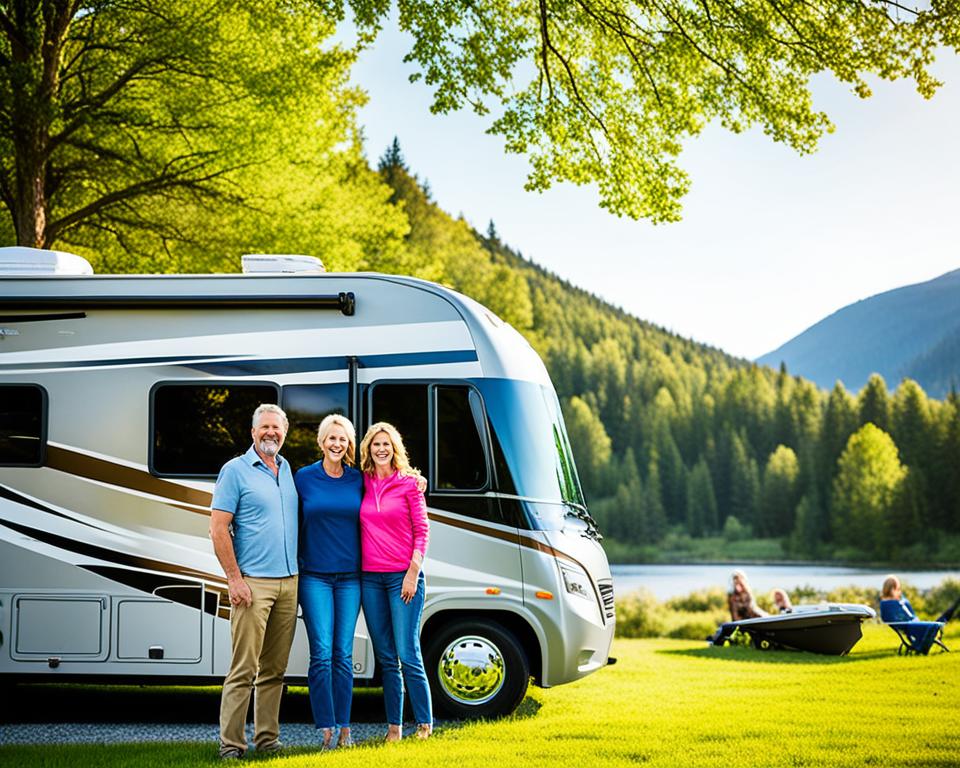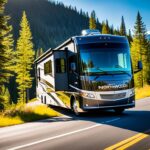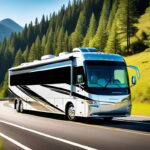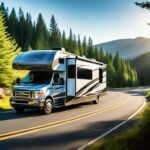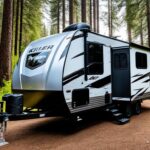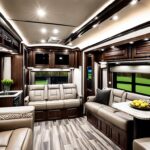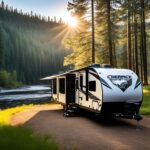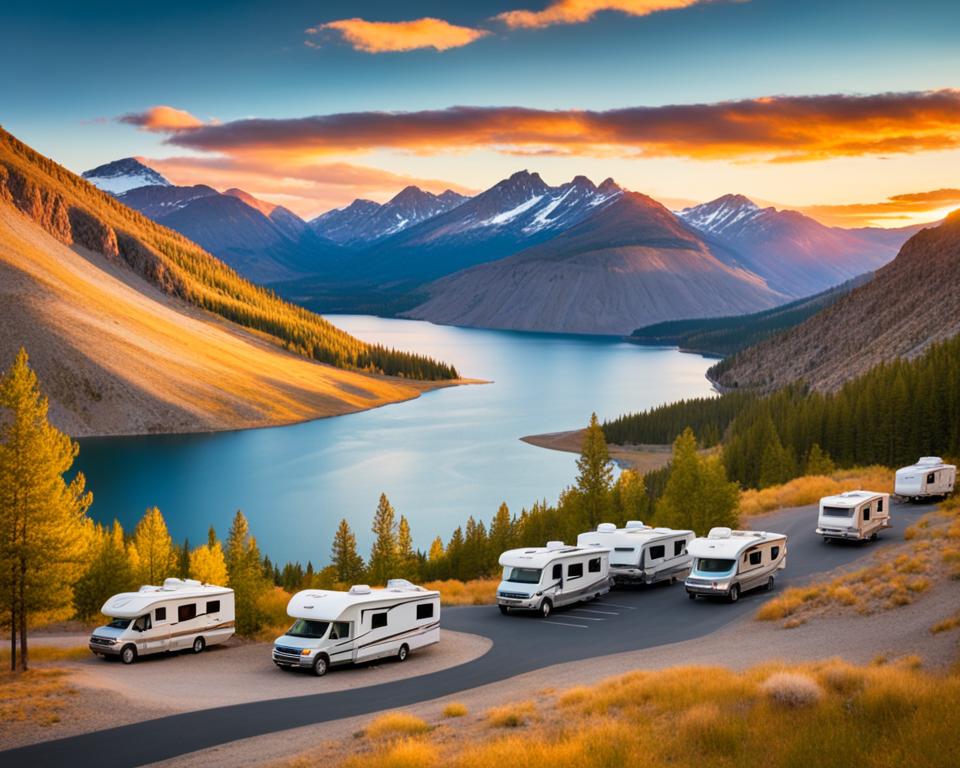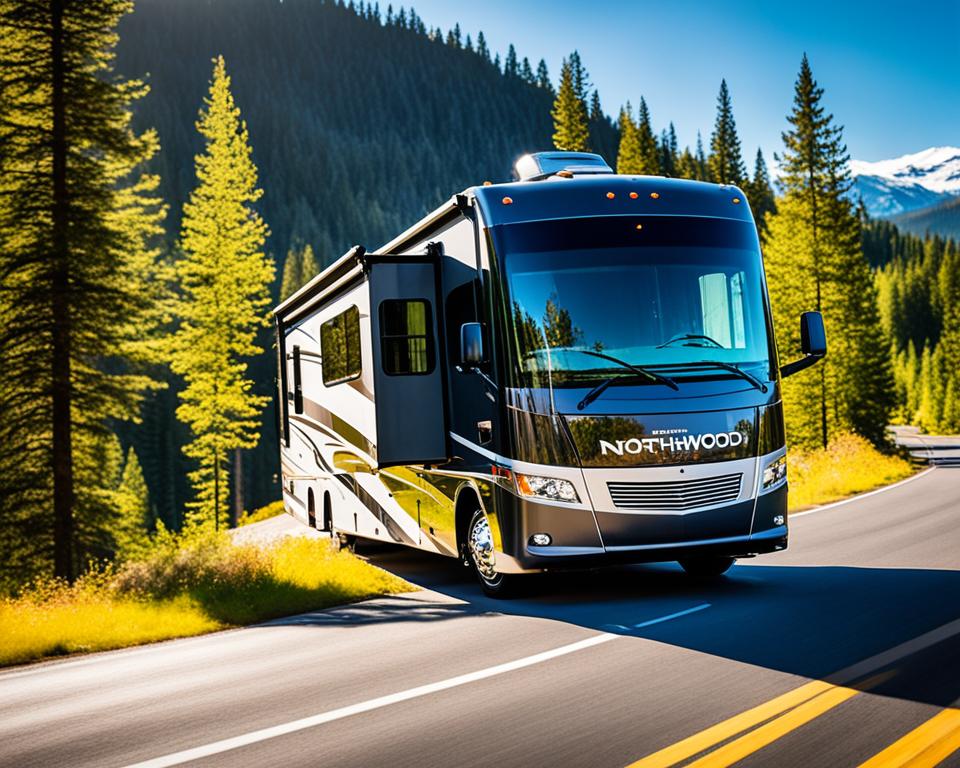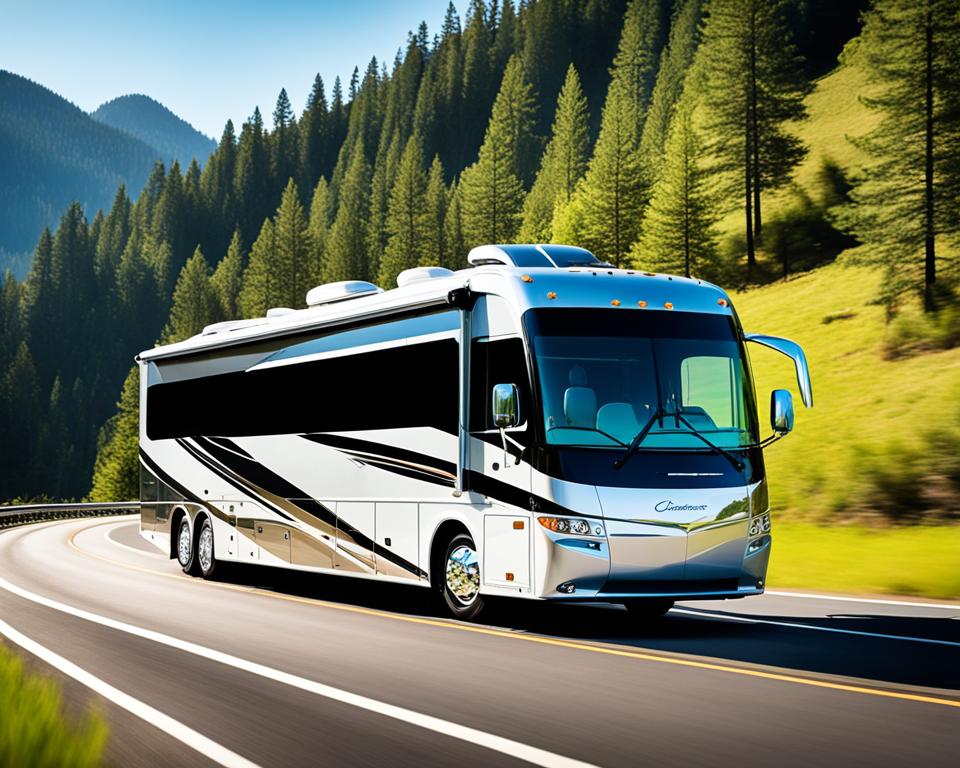If you’ve ever wondered what a recreational vehicle (RV) is, you’re in the right place. In simple terms, an RV is a motor vehicle or trailer that is equipped with living quarters designed for accommodation. These versatile vehicles allow users to travel, explore, and experience the great outdoors while still enjoying the comforts of home.
RVs come in various types, including motorhomes, campervans, coaches, caravans, fifth-wheel trailers, popup campers, and truck campers. Each type offers its unique features and benefits, catering to different preferences and travel styles.
So, what does RV mean? RV stands for recreational vehicle, which captures the essence of these exciting and multifunctional vehicles. Whether you’re embarking on a road trip, camping adventure, or cross-country expedition, an RV provides the perfect blend of mobility, comfort, and convenience.
Key Takeaways
- An RV is a motor vehicle or trailer designed with living quarters for accommodation
- RVs come in various types, including motorhomes, campervans, trailers, and more
- RVs provide the freedom to travel, explore, and experience the great outdoors
- The term RV stands for recreational vehicle, encapsulating the essence of these versatile vehicles
- RVs offer the perfect blend of mobility, comfort, and convenience
History of Recreational Vehicles
The history of recreational vehicles (RVs) can be traced back to the 18th century when horse-drawn carriages were used for rest and shelter during long journeys. These early ancestors of modern RVs provided travelers with a portable living space to rest, sleep, and enjoy meals.
The first purpose-built RV, known as the horse-drawn Wanderer, was commissioned in 1884 by Dr. William Gordon Stables. This innovative creation marked a significant milestone in the evolution of RVs and set the stage for the development of motorized and more advanced recreational vehicles.
Throughout the 20th century, the RV industry witnessed remarkable growth and innovation. The introduction of motorhomes, which combined transportation and living quarters, revolutionized the concept of travel and leisure. Travel trailers, another popular type of RV, allowed for more flexibility and convenience, making it easier for people to explore different destinations.
Today, RVs have come a long way from their humble beginnings. They offer a wide range of amenities and advanced technologies, ensuring a comfortable and enjoyable travel experience. From historical horse-drawn RVs to modern motorized RVs, the evolution of recreational vehicles reflects the ever-evolving needs and desires of travelers.
In the words of Samuel Ogle, an RV enthusiast and historian, “The history of RVs is a testament to human ingenuity and the desire for adventure. From the first horse-drawn RVs to the luxurious motorhomes of today, RVs have transformed the way we travel and experience the world.”
| Year | Milestone |
|---|---|
| 1884 | Commissioning of the horse-drawn Wanderer, the first purpose-built RV |
| 20th century | Introduction of motorhomes and travel trailers |
| Present | Modern RVs with advanced technologies and eco-friendly designs |
Different Types of Recreational Vehicles
Recreational vehicles come in various types to cater to different needs and preferences. Whether you prefer a motorhome, travel trailer, camper van, 5th wheel trailer, pop-up camper, or truck camper, there is an RV classification that suits your lifestyle.
Let’s explore the different types of recreational vehicles:
1. Class A Motorhome
The Class A motorhome is the largest and most luxurious type of RV. It is built on a specially designed chassis and offers spacious living quarters that include all the amenities of a modern home. Class A motorhomes are known for their size, comfort, and high-end features.
2. Class B Motorhome (Camper Van)
The Class B motorhome, also known as a camper van, is smaller in size and more maneuverable than its Class A counterpart. These RVs are built on a van chassis and offer compact living spaces with basic amenities such as a bed, kitchenette, and bathroom.
3. Class C Motorhome
The Class C motorhome is a mid-sized RV that combines the best features of the Class A and Class B motorhomes. It has a distinctive cab-over sleeping area and provides a comfortable and versatile living space. Class C motorhomes are popular among families and those looking for a balance between size and amenities.
4. Travel Trailer
A travel trailer is a towable RV that is hitched to a truck or SUV. It offers a wide range of floor plans and sizes, from compact and lightweight options to larger models with slide-outs for extra living space. Travel trailers are versatile and can be detached from the towing vehicle, allowing you to explore your destination without the need for an additional vehicle.
5. 5th Wheel Trailer
A 5th wheel trailer is similar to a travel trailer but is designed to be towed by a pickup truck with a special hitch configuration. The unique hitch placement provides better stability and maneuverability compared to traditional travel trailers. 5th wheel trailers often have multiple slide-outs, offering spacious and comfortable living areas.
6. Pop-up Camper
A pop-up camper, also known as a tent trailer or folding camper, is a lightweight and compact RV that is collapsible for easy towing and storage. When expanded, it provides sleeping areas, a small kitchenette, and basic amenities. Pop-up campers are an affordable option for those who want to experience camping with some comforts.
7. Truck Camper
A truck camper is a portable living unit that fits onto the bed of a pickup truck. It offers a compact and self-contained living space with sleeping areas, a small kitchenette, and a bathroom. Truck campers are versatile and can be easily removed from the truck, allowing you to use your vehicle for other purposes.
Each type of recreational vehicle has its unique characteristics, dimensions, and price ranges. Choosing the right RV depends on factors such as the number of occupants, desired amenities, and intended use. Take the time to research and consider your needs to find the perfect RV for your adventures.
Features of Recreational Vehicles
Recreational vehicles (RVs) offer a wide range of amenities that enhance the comfort and convenience of your travel experience. Whether you opt for a basic model or a luxurious one, RVs provide a home-away-from-home with essential facilities.
RV Amenities: RVs are equipped with various amenities to cater to your needs during your adventures. Here are some common amenities you can expect to find in an RV:
- Kitchen Facilities: RVs typically include a kitchen area with a stove, oven, sink, and storage space. This allows you to cook your meals and enjoy homemade dishes even when you’re on the road.
- Bathroom Amenities: RVs come with built-in bathrooms that feature a toilet, shower, and sink. This eliminates the need for public restrooms and provides privacy and convenience.
- Sleeping Quarters: Most RVs have dedicated sleeping areas, such as bedrooms or fold-out sofas, ensuring a comfortable night’s sleep wherever you choose to park.
Luxurious Features: If you prioritize luxury and comfort, you can find RVs with additional features that elevate your travel experience:
- Air Conditioning: Stay cool during hot summer days with built-in air conditioning systems that maintain a comfortable indoor temperature.
- Water Heaters: Enjoy hot showers even in remote locations thanks to water heaters that provide warm water on demand.
- Televisions: RVs often come equipped with televisions and entertainment systems, allowing you to unwind with your favorite shows and movies.
- Quartz Countertops: Some high-end RVs feature stylish quartz countertops in the kitchen area, providing a touch of elegance to your cooking space.
Expandable Sides and Canopies: Larger RVs often feature expandable sides or canopies that provide additional living space when parked. These extendable areas create room for relaxation, dining, or hosting guests.
Benefits of Owning a Recreational Vehicle
Owning a recreational vehicle (RV) is a gateway to a world of adventure, offering countless benefits to those who embrace the nomadic lifestyle. Let’s explore the advantages of RV ownership, from the freedom of travel to the convenience of having a home on wheels.
Freedom of Travel
One of the greatest advantages of owning an RV is the freedom to travel wherever and whenever you please. With an RV, you are no longer tied to hotel reservations or flight schedules. Instead, you have the flexibility to embark on spontaneous road trips, explore off-the-beaten-path destinations, and discover hidden gems that traditional tourists may miss.
Home on Wheels
Imagine having your own cozy, comfortable space that feels like home, no matter where you are. That’s exactly what an RV provides. With a fully-equipped kitchen, a bathroom, and comfortable sleeping quarters, your RV becomes your home away from home. You can customize the interior to suit your style and preferences, creating a personal oasis that reflects your unique personality.
“Owning an RV gives you the freedom to explore the world while always being surrounded by the comfort and familiarity of your own home.” – RV enthusiast
Convenience and Flexibility
RVs offer unparalleled convenience and flexibility compared to traditional modes of travel. You have the flexibility to change your travel plans on a whim or stay longer at a particular destination that captures your heart. Additionally, RVs allow you to bring along your beloved pets, eliminating the need for pet boarding or leaving them behind.
Cost Savings
RV ownership can also lead to significant cost savings. Instead of spending money on expensive hotels and dining out, you can cook your own meals in your RV’s kitchen and stay at affordable campsites. Furthermore, you can save on transportation costs by avoiding airfares, rental cars, and public transportation. Over time, these savings can add up, allowing you to make the most of your travel budget.
| Advantages of RV Ownership | Details |
|---|---|
| Flexibility | The ability to travel at your own pace, change plans easily, and stay longer at favorite destinations. |
| Cost Savings | Avoid expensive hotel stays and dining out, cook your own meals, and save on transportation costs. |
| Travel Freedom | Experience the joy of exploration, discovering hidden gems, and visiting remote locations. |
| Convenience | Enjoy the comfort of having all the necessary amenities and personal belongings wherever you go. |
Embrace the freedom of the open road, create unforgettable memories with loved ones, and explore the world on your terms. With the advantages of RV ownership, you can embark on endless adventures and live a life filled with unparalleled experiences.
Cost of Recreational Vehicles
The cost of recreational vehicles can vary greatly depending on various factors such as the type, size, and level of luxury. Prices can range from tens of thousands of dollars to several hundred thousand dollars. Whether you’re looking for a budget-friendly option or a high-end luxury RV, there are options available to suit different budgets and preferences.
For those seeking affordability, there is a wide range of RVs with price tags that fall within a more reasonable range. These RVs offer the basic comfort and amenities necessary for a pleasant travel experience without breaking the bank. If you’re willing to compromise on certain features or opt for a used RV, you can find even more cost-effective options.
On the other end of the spectrum, if you’re looking for a luxurious and fully-equipped RV with all the bells and whistles, you can expect to pay a premium. These high-end RVs offer top-of-the-line amenities, spacious interiors, and state-of-the-art technology. They are designed to provide a luxurious and comfortable travel experience for those who prioritize luxury and are willing to invest more in their RV.
RV Price Range:
Below is a breakdown of average price ranges for different types of recreational vehicles:
| Type of RV | Price Range |
|---|---|
| Class A Motorhome | $100,000 – $500,000+ |
| Class B Motorhome | $70,000 – $200,000+ |
| Class C Motorhome | $60,000 – $200,000+ |
| Travel Trailer | $10,000 – $150,000+ |
| Fifth Wheel Trailer | $30,000 – $200,000+ |
| Popup Camper | $5,000 – $25,000+ |
| Truck Camper | $10,000 – $50,000+ |
It’s important to note that these price ranges are estimates and can vary depending on factors such as brand, model, features, and optional add-ons. Additionally, prices may also vary depending on the market and location.
For those who are unable to pay the full cost upfront, RV financing is a common option. Many dealerships and financial institutions offer financing options specifically tailored for RV purchases. This allows individuals to spread out the cost over a specific term, making ownership more accessible and affordable for a wider range of people.
Whether you’re looking for an affordable RV within a specific price range or are willing to invest in a higher-end luxury model, there is a wide range of options available to suit different budgets and preferences. RV financing also provides flexibility for those who prefer to spread out the cost over time. By considering your needs, budget, and desired features, you can find an RV that fits your lifestyle and travel goals.
Target Audience for Recreational Vehicles
Recreational vehicles (RVs) have wide appeal and cater to a diverse range of individuals and families. Whether you’re an outdoor enthusiast, adventure seeker, or simply someone who wants to explore different destinations at your own pace, an RV offers the perfect solution. It’s not just a means of transportation but an entire experience, providing the freedom to embrace a nomadic lifestyle and create lasting memories along the way.
For RV enthusiasts, owning an RV is more than just a mode of travel. It’s a way of life, allowing you to embrace the open road and experience the joy of discovering new places. RVs offer the ultimate convenience of traveling with all the comforts of home, no matter where you go. With the ability to customize your RV to suit your needs and preferences, it becomes a personalized sanctuary that reflects your unique style and taste.
Family travelers also find RVs to be an ideal choice. Gone are the days of cramped hotel rooms and the hassle of constantly packing and unpacking luggage. With an RV, you have all the space you need to comfortably accommodate your family and enjoy quality time together. Whether you’re embarking on a weekend getaway or an extended road trip, an RV provides the flexibility and convenience to cater to your family’s needs.
Outdoor adventurers are drawn to RV travel because it allows them to fully immerse themselves in nature. Whether you’re into hiking, fishing, kayaking, or simply enjoying breathtaking scenery, an RV gives you the freedom to explore the great outdoors while having a cozy home base. It’s the perfect companion for an active and adventurous lifestyle, enabling you to effortlessly transition from one outdoor activity to another.
So, whether you’re a seasoned RV enthusiast, a family traveler in search of unforgettable experiences, or an outdoor adventurer seeking the thrill of exploration, an RV offers endless possibilities and unmatched convenience. It’s not just a vehicle; it’s a ticket to embark on unforgettable journeys and create memories that will last a lifetime.
Life Expectancy of Recreational Vehicles
When it comes to the life expectancy of a recreational vehicle (RV), several factors come into play. The quality of construction, regular maintenance, and patterns of usage all contribute to determining how long an RV can last. By ensuring proper care and maintenance, RV owners can extend the life of their vehicles and enjoy many years of memorable travel experiences.
Regular inspection and servicing are essential for maintaining the durability of an RV. Conducting thorough check-ups on a routine basis allows owners to identify any issues or potential problems early on. Addressing these repairs promptly helps prevent further damage and ensures that the RV remains in good working condition for longer periods.
Proper maintenance also involves adhering to manufacturer guidelines and following recommended service schedules. This includes servicing the engine, checking fluid levels, inspecting the electrical and plumbing systems, and keeping the RV clean and free from any potential hazards. Following these guidelines not only prolongs the longevity of the RV but also enhances its overall performance and safety.
Additionally, taking precautions during usage can significantly impact the lifespan of an RV. Being mindful of weight limits, road conditions, and environmental factors such as extreme weather can help reduce wear and tear on the vehicle. Avoiding excessive speeds, abrupt stops, and rough terrains can minimize strain on the RV’s components and contribute to its durability.
Maintaining an RV for Longevity:
- Regular inspection and servicing
- Adhering to manufacturer guidelines
- Following recommended service schedules
- Being mindful of weight limits and road conditions
- Avoiding excessive speeds and rough terrains
“With proper care and maintenance, RVs can provide many years of enjoyable travel experiences.”
By understanding the importance of regular maintenance, addressing repairs promptly, and adopting responsible usage practices, RV owners can maximize the lifespan of their vehicles. With a little effort and attention to detail, RVs can continue to serve as reliable and cherished companions for countless adventures on the open road.
| Factors Affecting RV Lifespan | Maintenance | Usage Patterns |
|---|---|---|
| Quality of Construction | Regular inspection and servicing | Adhering to weight limits |
| Proper Maintenance | Following manufacturer guidelines | Considering road conditions |
| Responsible Usage | Recommended service schedules | Avoiding excessive speeds |
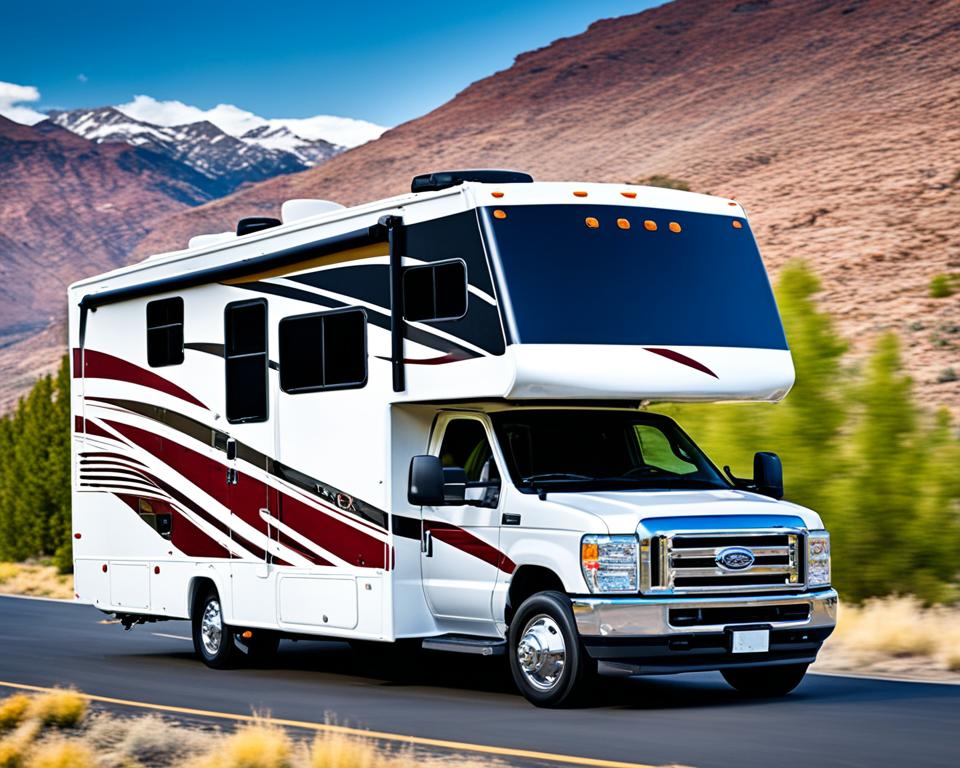
With a combination of diligent care, regular maintenance, and responsible usage, RV owners can ensure that their vehicles remain durable and reliable for many years to come.
Conclusion
Recreational vehicles (RVs) are an incredibly versatile and exciting way to travel, providing the freedom to explore new destinations while enjoying the comforts of home. Understanding the meaning of a recreational vehicle, having a comprehensive RV guide at your disposal, and choosing the right RV for your needs are essential steps to embark on a memorable RV travel adventure.
RVs come in various types and sizes, ranging from motorhomes and travel trailers to camper vans and pop-up campers. Each type offers unique features and amenities, allowing travelers to customize their experience. By considering factors such as budget, camping preferences, and desired comforts, individuals and families can make an informed decision when selecting the perfect RV.
The benefits of RV travel are numerous. From the freedom to travel at your own pace and the convenience of having a home on wheels to the flexibility to explore diverse destinations and the cost savings compared to traditional travel, RVs provide endless opportunities for incredible experiences. Whether you’re setting out on a short road trip or embarking on a long-term nomadic lifestyle, RVs are the perfect companion to fuel your spirit of adventure.
So, if you’re ready to embark on a journey of exploration, relaxation, and discovery, consider the possibilities that recreational vehicles offer. Take the time to understand the meaning of recreational vehicles, consult an RV guide, and make a choice that aligns with your travel aspirations. The world is your oyster, and with an RV, you can navigate it with ease, comfort, and limitless excitement.
FAQ
What is a recreational vehicle?
A recreational vehicle, or RV for short, is a motor vehicle or trailer that includes living quarters designed for accommodation.
What types of recreational vehicles are there?
There are several types of RVs, including motorhomes, campervans, coaches, caravans, fifth-wheel trailers, popup campers, and truck campers.
How did recreational vehicles evolve?
RVs have evolved from horse-drawn carriages used for rest in the 18th century to motorized vehicles designed for travel and leisure. The first purpose-built RV was the horse-drawn Wanderer commissioned in 1884.
What amenities do recreational vehicles typically offer?
RVs usually offer amenities such as kitchens, bathrooms, and sleeping quarters. They can range from basic with minimal facilities to luxurious with features like air conditioning, water heaters, televisions, and quartz countertops.
What are the benefits of owning a recreational vehicle?
Owning an RV provides the freedom to travel at your own pace with the comforts of home nearby. RVs offer convenience, flexibility, and cost savings compared to traditional travel and accommodation options. They allow you to explore various destinations, enjoy outdoor activities, and create lasting memories with family and friends.
How much do recreational vehicles cost?
The cost of RVs can vary greatly depending on the type, size, and level of luxury. Prices can range from tens of thousands of dollars to several hundred thousand dollars. Additionally, there are options for RV financing to make ownership more accessible to a wider range of individuals.
Who are recreational vehicles best for?
RVs appeal to a diverse range of individuals and families. They are popular among outdoor enthusiasts, adventure seekers, and those who want to explore different destinations at their own pace. RVs are also a great option for family vacations, offering the convenience of traveling with all the comforts of home.
How long can a recreational vehicle last?
The life expectancy of an RV depends on various factors, including the quality of construction, regular maintenance, and usage patterns. With proper care and maintenance, RVs can last for many years and provide enjoyable travel experiences.
What should I know about recreational vehicles?
Understanding the different types of RVs, their features, and the benefits of owning one can help individuals and families make informed choices when it comes to RV travel. Whether it’s a short road trip or a long-term nomadic lifestyle, RVs fuel the spirit of adventure and provide endless possibilities for memorable experiences.

